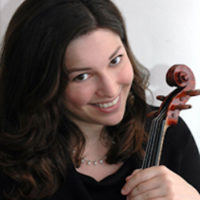Violinist/Violist Paula Majerfeld has led a diverse career as teacher, soloist, chamber musician, orchestral player, and advocate for culturally-underserved children.
An avid chamber musician, Ms. Majerfeld’s collaborators have included Boston Symphony Orchestra concertmasters Joseph Silverstein and Malcolm Lowe; International Tchaikovsky Competition prizewinners Elmar Oliveira and Nathaniel Rosen; famed soloists Kim Kashkashian, Charles Castleman and Paul Katz; and esteemed musicians such as Steven Ansell, Ronald Thomas, Peter Zazofsky, and Joseph Robinson. As Co-Director of the chamber music series “Lyrica Boston”, Ms. Majerfeld has created opportunities for many up-and-coming young musicians to perform alongside highly renowned artists.
Ms. Majerfeld has appeared throughout the United States as a guest soloist with the Colorado and Jefferson Symphonies, and the Boulder Philharmonic. She has also appeared as soloist with the orchestras of the Las Vegas International Music Festival, Park City Summer Music Festival, Killington Music Festival and Lyrica New Jersey.
After serving as Assistant Principal of the Portland Symphony Orchestra, Ms. Majerfeld joined the faculty of the Longy School of Music at Bard College in 2000. She was subsequently appointed to teach at the New England Conservatory of Music and Wellesley College. She has also served on the faculties of various summer music festivals such as Lyricafest and the Castleman Quartet Program. As Dean of the Castleman Quartet Program, she spearheaded a new branch of the festival at the University of Colorado at Boulder.
A recipient of both the Wingler and Starling Foundation Fellowships, Ms. Majerfeld was awarded the highly coveted ACMA/Dodge Partnership and Roxbury Foundation Grants for her work with culturally-underserved children. She has also played at numerous “Head Start” programs, children’s hospitals, and elementary schools for children with medical ailments. Ms. Majerfeld is bilingual and fluent in Spanish.
B.M., M.M. with distinction, Indiana University. Recipient of the Indiana University Starling Foundation Fellowship, Indiana University Wingler Fellowship, Geraldine Dodge Partnership Grant, and Roxbury Highland Charitable Foundation Grant. First prize winner at the Jefferson Symphony International Music Competition. Isabella Cannepa Memorial Award for 2002 Artist of the Year.
Student of Dylana Jenson (protégé of Nathan Milstein and International Tchaikovsky Competition Prizewinner), Sando Xia (protégé of Jascha Heifetz), Nelli Shkolnikova (Moscow Conservatory, 1st Prize Jacques Thibaud Competition), Michelle Auclair (Paris Conservatory, 1st Prize Jacques Thibaud Competition), Terry King (protégé of Gregor Piatigorsky), Laura Bossert (protégé of Charles Castleman, Henryk Szeryng International Violin Competition Medalist).
Teaching Philosophy
Within a warm and supportive studio environment, my goal is to encourage students to think both analytically and creatively so that they discover their own unique, expressive voices. I don’t ask students to replicate my musicality, fingerings, or bowings. Instead, I attempt to nurture the individuality of students
so that they ultimately become artists in their own right. In the words of the great ballerina Margot Fonteyn, ‘Great artists are people who find the way to be themselves in their art.’
To that end, I believe a solid mastery of technical skills is necessary to express oneself without hindrance. However, I always reinforce that technique is not an end unto itself, but rather the means by which we attain our ultimate goal of self-expression. Keeping this in mind makes technical work much more interesting, practical, and goal-oriented. When we think within a musical context, it shapes the way we work on technique.
In my teaching, I place considerable emphasis on how to practice effectively by employing analytical, experimental, and creative approaches. In this manner, students learn to teach themselves using the most efficient and productive methods. A problem is best solved by approaching it from multiple different angles; practicing something the same way repeatedly tends to be ineffective and inhibits the learning process. It is also important for students to find which practice strategies work best for themselves. This varies widely from person to person. My greatest hope is that that upon completion of their degree, my students will have become their own best teacher.
I also believe strongly in the importance of working collaboratively with students, both during their course of study, as well as post-graduation, to help them create a career path through which they find a fulfilling niche in the musical world.

